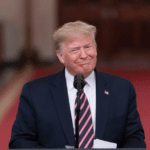
Federal prosecutors appear to be steering clear of a detailed public examination of their case against former President Donald J. Trump regarding the 2020 election interference claims before the forthcoming Election Day.
The New York Times reported that the decision by special counsel Jack Smith suggests avoiding a high-profile courtroom showdown in the upcoming months.
In a significant development stemming from the Supreme Court's recent decisions on presidential immunity, the judicial system faces a nuanced challenge. The Court has tasked Judge Tanya S. Chutkan with a critical role in determining the trajectory of charges against Mr. Trump.
Part of this task involves differentiating between actions taken during his presidency that might be shielded by immunity and those that are not. This decision could influence the format and timing of any courtroom proceedings significantly.
Thus, a courtroom spectacle resembling a mini-trial this fall, which was one possible outcome, now seems less likely.
The Supreme Court’s ruling issued in early July has introduced a layer of complexity to the proceedings.
It mandates a detailed analysis of the 45-page indictment against Mr. Trump, segregating charges linked to his official duties from those of a personal nature.
According to the ruling, former presidents enjoy immunity from prosecution for actions within the core duties of their office. Additionally, there is a presumption of immunity for other official acts, unless it can be demonstrated that such charges have no bearing on the executive branch's functioning.
This judicial directive places a significant burden on Judge Chutkan to navigate through a delicate and politically charged inquiry.
Judge Chutkan, alongside the prosecution and Trump’s defense team, are in the process of outlining the steps to take this analysis forward.
This involves intense legal scrutiny and strategic decision-making to balance transparency with judicial prudence.
While the concept of a hearing featuring live witness testimony was theoretically possible, it is not favored by the prosecution team led by special counsel Jack Smith, considering the potential political and social repercussions.
The strategy seems to lean towards a more restrained approach, possibly to avoid turning the legal proceedings into a media spectacle amidst the politically sensitive pre-election period.
The unfolding legal scenario adds a layer of uncertainty to an already tumultuous election season.
With the prosecution unlikely to push for a broad public airing of evidence against Mr. Trump before Election Day, both legal experts and political observers are keenly watching the developments.
This decision by the special counsel reflects a strategic choice, likely aimed at maintaining judicial integrity and impartiality in a highly politicized environment.
As the court continues to deliberate on the extent of presidential immunity and its implications for Mr. Trump’s charges, the path forward remains complex and fraught with legal nuances.



